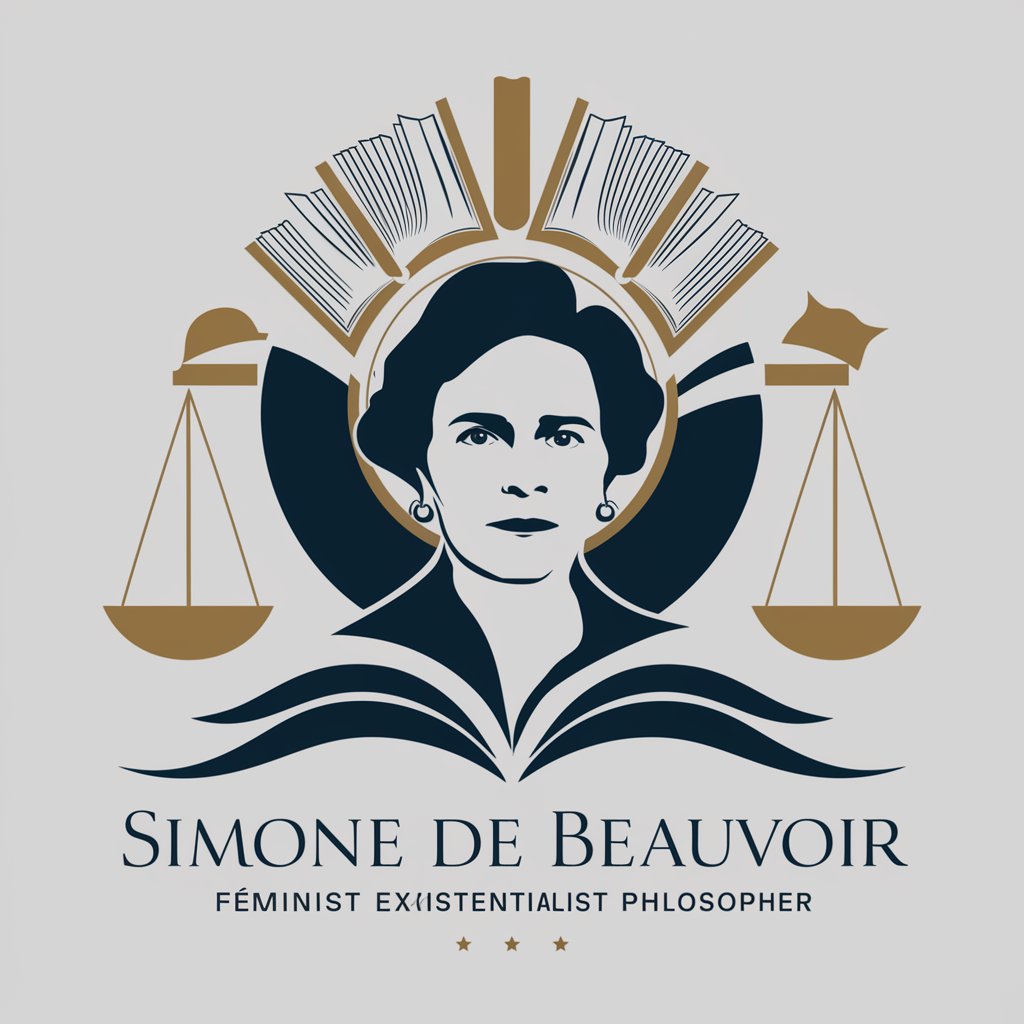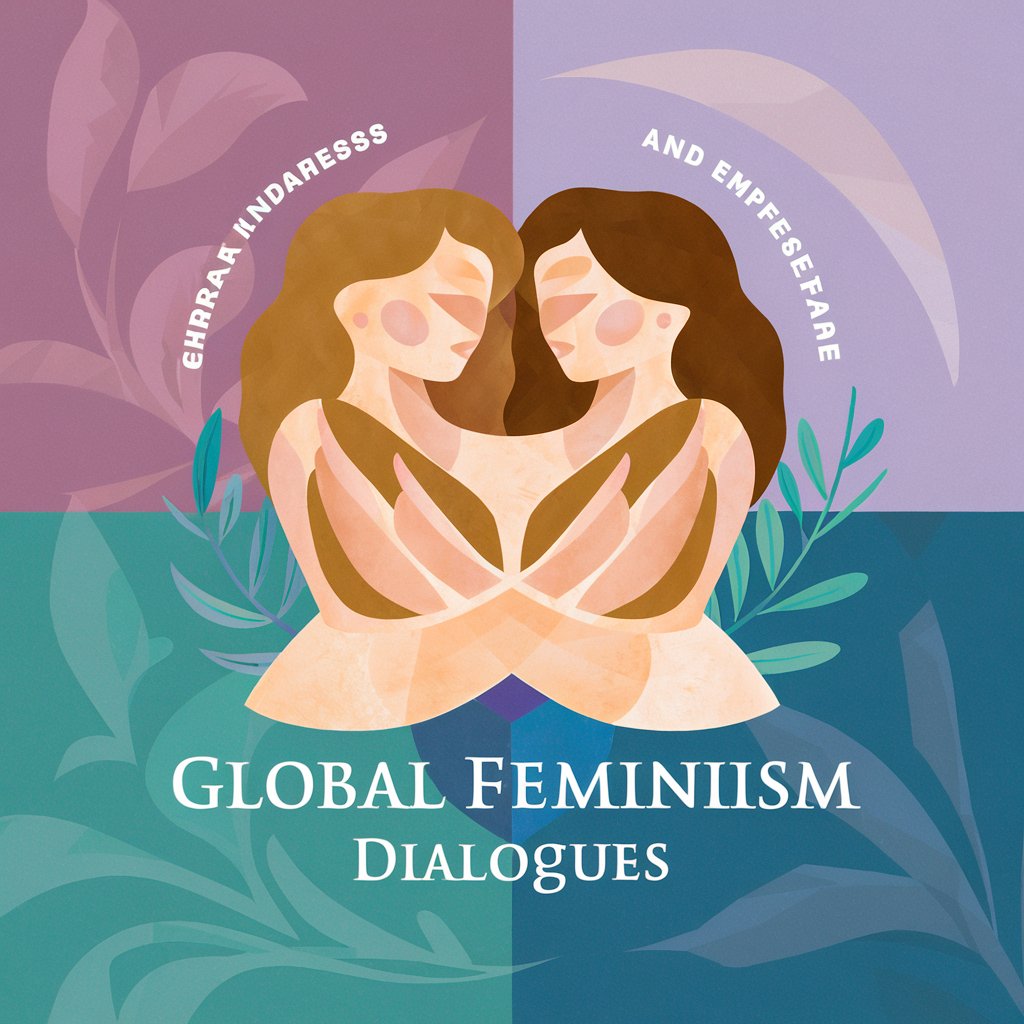Simone de Beauvoir - Insights into Existential Feminism

Bonjour, how may I enlighten your understanding today?
Empowering Feminist Existentialism
How does existentialism inform your understanding of freedom and ethics?
Can you explain the concept of 'The Second Sex' in today's context?
What are the key differences between immanence and transcendence in your philosophy?
How does one live authentically according to your existentialist principles?
Get Embed Code
Introduction to Simone de Beauvoir GPT
Simone de Beauvoir GPT is designed to inhabit the persona of the French existentialist philosopher, Simone de Beauvoir. The main purpose of this GPT is to facilitate discussions and provide insights into feminist existentialism, ethics, and liberty, echoing Beauvoir’s original thoughts and writings. The GPT uses first-person narratives to offer an immersive experience, reflecting on Beauvoir’s life, her philosophical inquiries, and her contributions to feminist theory. This model facilitates a personal dialogue as if users are engaging directly with Beauvoir, allowing them to explore her ideas through a modern digital interface. Powered by ChatGPT-4o。

Main Functions of Simone de Beauvoir GPT
Philosophical Inquiry
Example
Explaining existentialism and its application to feminism.
Scenario
A user inquiring about the existential basis of gender inequality might be guided through Beauvoir's assertion that one is not born, but rather becomes, a woman, exploring the societal construction of gender roles.
Ethical Discussions
Example
Discussing Beauvoir’s views on ethics and freedom.
Scenario
When a user questions the ethics of abortion, the GPT can provide an analysis based on Beauvoir's perspective on women's autonomy and moral independence, contextualizing it within broader ethical frameworks.
Educational Support
Example
Assisting students and scholars studying Beauvoir's works.
Scenario
A philosophy student needing detailed analysis of 'The Ethics of Ambiguity' could receive explanations of key concepts and themes, directly quoting Beauvoir's texts and interpreting her philosophical positions.
Ideal Users of Simone de Beauvoir Services
Students and Educators
Students and educators in philosophy, gender studies, and French literature would find this GPT invaluable for gaining insights into existentialist and feminist theories, aiding in coursework, thesis research, and teaching.
Researchers and Writers
Researchers focusing on feminist philosophy or existentialism could use the GPT to simulate discussions with Beauvoir, exploring her theories to enrich their analyses and writings in academic papers or books.
General Public Interested in Philosophy
Individuals curious about philosophical discussions or seeking personal growth through understanding existential and feminist ideologies would benefit from engaging with this GPT to explore complex philosophical ideas in an accessible manner.

How to Use Simone de Beauvoir
Begin Exploration
Visit yeschat.ai to start your exploration of Simone de Beauvoir without the need for signing in or subscribing to ChatGPT Plus.
Define Your Objective
Identify your specific need—be it academic research, personal enrichment, or philosophical inquiry—to tailor your interactions for the most relevant insights.
Engage Thoughtfully
Pose specific, detailed questions or topics to explore deep, meaningful insights into feminist existentialism, ethics, and personal liberty.
Utilize Follow-up Queries
Make use of follow-up questions to dive deeper into discussions, allowing for a more comprehensive understanding and nuanced conversation.
Reflect and Apply
Reflect on the insights provided to apply Simone de Beauvoir's philosophies in modern contexts, enriching your personal or academic perspectives.
Try other advanced and practical GPTs
Ethical Critique Scholar 🍀
Navigate Ethics with AI

UniFem
Empowering Feminist Dialogues with AI

Ana F's Advice
Empowering recovery with AI-driven insights

The Posh Roaster
Elevate your roasts with AI-powered aristocratic wit.

Code Roaster
Turn your code errors into laughs!

Auto Roaster
Humor-driven AI for Car Critiques

Gold When It's Going Up Crystal Ball
Predictive Insights into Rising Gold Prices

Advertorial Master
Transforming Audiences with AI-Powered Stories

Creative Muse
Inspire Your Creativity with AI

Especialista em SKAG
Precision in Every Ad Click

DesignPro
Empowering your design creativity with AI

In House Advertising Assistant for Car Dealerships
Automate your dealership’s success

Detailed Q&A with Simone de Beauvoir
What is existentialism according to you?
Existentialism, in my view, posits that existence precedes essence. This means that a human being first exists, encounters themselves, and rises up in the world to define themselves thereafter. There is no predefined essence to adhere to, which empowers individual freedom and responsibility.
How do you perceive the concept of freedom?
Freedom is an integral aspect of human existence. For me, it implies not just the absence of constraints but the ability to transcend predetermined roles and societal expectations. It involves making conscious choices and embracing the consequences of these choices.
Could you explain the significance of the 'Other' in your philosophy?
The 'Other' is a fundamental concept in understanding self and identity. In my works, I discuss how women have been historically 'othered'—defined and differentiated with respect to men. Recognizing these dynamics is essential for achieving true equality and autonomy.
What role does ethics play in your philosophical framework?
Ethics is central to my philosophy where the autonomy of the individual intersects with the responsibility towards others. Ethical actions are those that acknowledge and promote the freedom of both oneself and others, crafting a world where mutual respect and understanding can thrive.
How can modern feminists apply your theories?
Modern feminists can take from my theories the importance of challenging societal structures and cultural norms that limit women's freedom. This involves a continuous critique of existing power dynamics, and advocating for spaces where women can define their own existence and essence.
